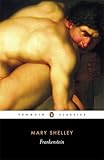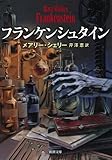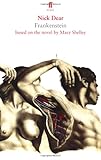
Frankenstein (Penguin Classics)
Mary Shelly's "Frankenstein" is quite different from the movies based on it--so different that it seems as if they are two other works. This novel is an extraordinary book. It is a very bad novel. It is a very good one. It is ugly. It has beauty. It is a terrible, an agonizing, a powerful and a passionate book. It is unbelievable that a 19-year-old girl could have written it as her first novel. But notice that this is wildly romantic. Now, romanticism eschews the patient observation of realism; it revels in the unbridled flight of the imagination and indulges, sometimes with gusto, sometimes with gloom, in horror, mystery, passion and violence. Who can tell what horrible reveries the author had in her daily lives which seemed ordinary from the outsider?
I think Mary put the whole of herself into the monster. By the way, although many people make the mistake of thinking that the creature in the novel is named Frankenstein, the truth is that Frankenstein is actually the name of the doctor who created the monster. The monster significantly has no name.
I think Mary gave this nameless monster her violent rage, her frustration, her passion of unsatisfied love, her jealousy. When the monster appeals to Frankenstein, "Oh, Frankenstein, be not equitable to every other and trample upon me alone, to whom thy justice, and even thy clemency and affection, is most due. Remember that I am thy creature; I ought to be thy Adam, but I am rather the fallen angel, whom thou drivest from joy for no misdeed. Everywhere I see bliss, from which I alone am irrevocably excluded. I was benevolent and good; misery made me a fiend. Make me happy, and I shall again be virtuous.", I think, Mary must have identified herself with the monster. I think she was herself the monster in a sense. I can think of no other novel in which the pain and agony of not being loved has been so powerfully set forth.
Incidentally, Mary's life was haunted by deaths. Her mother died when she was eleven days old. Mary began an improper relationship with the married Percy Bysshe Shelley, a famous poet, at the age of 16. Soon Mary was pregnant with Percy's child, but their prematurely born daughter only lived for a few days. Percy Shelley's first wife Harriet committed suicide in 1816 because of her husband's love affair. Percy and Mary married in late 1816 after Harriet's suicide. Mary's illegitimate half-sister, Fanny Imlay also committed suicide in the same year Harriet did for some reason connected with Mary.
The Shelleys left Britain in 1818 for Italy, where their second and third children died before Mary Shelley gave birth to her last and only surviving child, Percy Florence. In 1822, her husband drowned when his sailing boat sank during a storm in the Bay of La Spezia.
Except for the deaths of her mother and prematurely born daughter, all the other deaths occurred after Mary created the monster. It is an absurd idea to think that these were occasioned by the revengeful monster. But the monster is presented with such wonderful power, solidity and liveliness that one is inclined to think so.
I think Mary put the whole of herself into the monster. By the way, although many people make the mistake of thinking that the creature in the novel is named Frankenstein, the truth is that Frankenstein is actually the name of the doctor who created the monster. The monster significantly has no name.
I think Mary gave this nameless monster her violent rage, her frustration, her passion of unsatisfied love, her jealousy. When the monster appeals to Frankenstein, "Oh, Frankenstein, be not equitable to every other and trample upon me alone, to whom thy justice, and even thy clemency and affection, is most due. Remember that I am thy creature; I ought to be thy Adam, but I am rather the fallen angel, whom thou drivest from joy for no misdeed. Everywhere I see bliss, from which I alone am irrevocably excluded. I was benevolent and good; misery made me a fiend. Make me happy, and I shall again be virtuous.", I think, Mary must have identified herself with the monster. I think she was herself the monster in a sense. I can think of no other novel in which the pain and agony of not being loved has been so powerfully set forth.
Incidentally, Mary's life was haunted by deaths. Her mother died when she was eleven days old. Mary began an improper relationship with the married Percy Bysshe Shelley, a famous poet, at the age of 16. Soon Mary was pregnant with Percy's child, but their prematurely born daughter only lived for a few days. Percy Shelley's first wife Harriet committed suicide in 1816 because of her husband's love affair. Percy and Mary married in late 1816 after Harriet's suicide. Mary's illegitimate half-sister, Fanny Imlay also committed suicide in the same year Harriet did for some reason connected with Mary.
The Shelleys left Britain in 1818 for Italy, where their second and third children died before Mary Shelley gave birth to her last and only surviving child, Percy Florence. In 1822, her husband drowned when his sailing boat sank during a storm in the Bay of La Spezia.
Except for the deaths of her mother and prematurely born daughter, all the other deaths occurred after Mary created the monster. It is an absurd idea to think that these were occasioned by the revengeful monster. But the monster is presented with such wonderful power, solidity and liveliness that one is inclined to think so.

フランケンシュタイン (新潮文庫)
映画などで物語を知っているつもりだったが、恥ずかしながら原作をまともに読んだ事は無かった。新訳を機に読み、未読だったことを後悔している。
一般に流布している凶暴な人造人間のイメージとは違い、本書における怪物はミルトンの『失楽園』を引用する程の知性を持ち、自らの存在に苦悶する孤独な魂として描かれる。その普遍的な絶望の深さは喪失感に苛まれた現代人の生にも通じ、思索的な青春小説のような味わいさえ感じられる。そして凄愴な美を湛えた悲劇的な結末には大いに胸を打たれる。
近代的知性が中世の宗教的権威を超克しようとする時代を背景に、禁忌を犯す畏怖と葛藤の念が科学者フランケンシュタインの苦悩と悲劇に反映されたゴシック・ロマンの名作であり、マッド・サイエンティスト・テーマのSFの嚆矢的作品でもある。
(原題 Frankenstein: or The Modern Prometheus 原著初刊1818年)
一般に流布している凶暴な人造人間のイメージとは違い、本書における怪物はミルトンの『失楽園』を引用する程の知性を持ち、自らの存在に苦悶する孤独な魂として描かれる。その普遍的な絶望の深さは喪失感に苛まれた現代人の生にも通じ、思索的な青春小説のような味わいさえ感じられる。そして凄愴な美を湛えた悲劇的な結末には大いに胸を打たれる。
近代的知性が中世の宗教的権威を超克しようとする時代を背景に、禁忌を犯す畏怖と葛藤の念が科学者フランケンシュタインの苦悩と悲劇に反映されたゴシック・ロマンの名作であり、マッド・サイエンティスト・テーマのSFの嚆矢的作品でもある。
(原題 Frankenstein: or The Modern Prometheus 原著初刊1818年)









